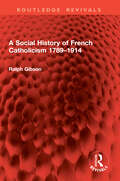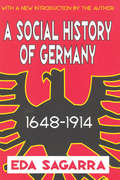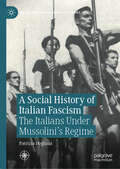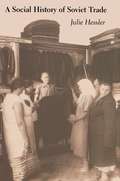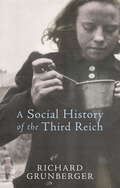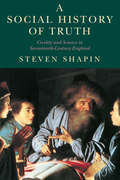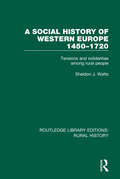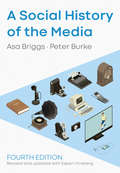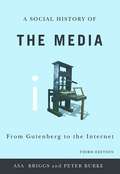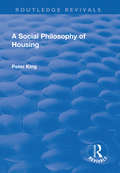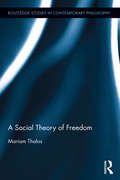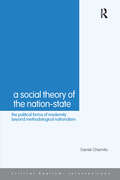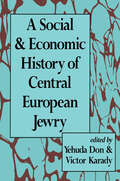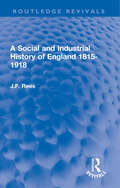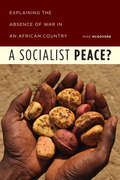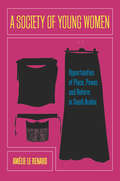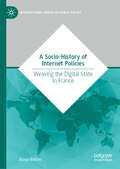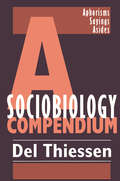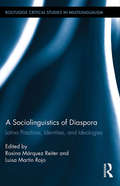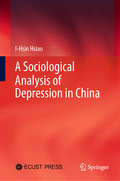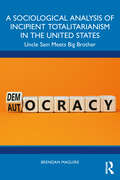- Table View
- List View
A Social History of France, 1789–1914
by Peter McpheeThis volume provides a lively and authoritative synthesis of recent work on the social history of France and is now thoroughly updated to cover the 'long nineteenth century' from 1789-1914. Peter McPhee offers both a readable narrative and a distinctive, coherent argument about this remarkable century and explores key themes such as: - peasant interaction with the environment - the changing experience of work and leisure - the nature of crime and protest - changing demographic patterns and family structures - the religious practices of workers and peasants - the ideology and internal repercussions of colonisation. At the core of this social history is the exercise and experience of 'social relations of power' - not only because in these years there were four periods of protracted upheaval, but also because the history of the workplace, of relations between women and men, adults and children, is all about human interaction. Stimulating and enjoyable to read, this indispensable introduction to nineteenth-century France will help readers to make sense of the often bewildering story of these years, while giving them a better understanding of what it meant to be an inhabitant of France during that turbulent time.
A Social History of French Catholicism 1789–1914 (Routledge Revivals)
by Ralph GibsonFirst published in 1989, A Social History of French Catholicism 1789–1914 is a clear survey of over a hundred years of Catholicism in French society. It chronicles the religious experience of French men and women, both clergy and laity, in post-revolutionary France. The book begins with a look at Catholic life in the Old Regime and during the French Revolution, and proceeds to topical chapters on the secular clergy, the religious orders, popular religion, religious practice by region, gender and age, and the social classes. The final chapter deals with the re-Christianization of France in the latter part of the nineteenth century. This volume will be of interest to students and researchers of history and religion.
A Social History of Germany, 1648-1914
by Eda SagarraThis volume is a pioneering effort to examine the social, demographic, and economic changes that befell the Jewish communities of Central Europe after the dissolution of the Habsburg Empire. It consists of studies researched and written especially for this volume by historians, sociologists, and economists, all specialists in modern Central European Jewish affairs. The era of national rivalry, economic crises, and political confusion between the two World Wars has been preceded by a pre-World War I epoch of Jewish emancipation and assimilation. During that period, Jewish minorities had been harbored from violent anti-Semitism by the Empire, and they became torchbearers of industrialization and modernization. This common destiny encouraged certain common characteristics in the three major components of the Empire, Austria, Hungary, and the Czech territories, despite the very different origins of the well over one million Jews in those three lands. The disintegration of the Habsburg Empire created three small, economically marginal national states, inimical to each other and at liberty to create their own policies toward Jews in accord with the preferences of their respective ruling classes. Active and openly discriminatory anti-Semitic measures resulted in Austria and Hungary. The only liberal heir country of the Empire was Czechoslovakia, although simmering anti-Semitism and below surface discrimination were widespread in Slovakia. While one might have expected Jewish communities to return to their pre-World War I tendencies to go their independent ways after the introduction of these policies, social and economic patterns which had evolved in the Habsburg era persisted until the Anschluss in Austria, German occupation in Czechoslovakia, and World War II in Hungary. Studies in this volume attest to continuing similarities among the three Jewish communities, testifying to the depth of the Empire's long lasting impact on the behavior of Jews in Central Euro
A Social History of Italian Fascism: The Italians Under Mussolini’s Regime (Italian and Italian American Studies)
by Patrizia DoglianiThis book uncovers how fascism reshaped Italian society according to its ideological and historical interpretation of the Italian nation and people and identifies the strengths of this transformation, but also the resistance encountered from, for example, women and minority groups, to accept it in everyday life. It analyzes the success achieved by some policies aimed at popular masses in order to integrate them into the nation, and how fascism initiated an early welfare state project to address specific categories of society such as veterans, families, mothers and children. The book also questions the concept and practices of social citizenship reserved only for those who gave evidence of formal adherence to fascism.
A Social History of Sheffield Boxing, Volume I: Rings of Steel, 1720–1970 (Palgrave Studies in Urban Anthropology)
by Gary Armstrong Matthew BellA Social History of Sheffield Boxing combines urban ethnography and anthropology, sociological theory and place and life histories to explore the global phenomenon of boxing. Raising many issues pertinent to the social sciences, such as contestations around state regulation of violence, commerce and broadcasting, pedagogy and elite sport and how sport is delivered and narrated to the masses, the book studies the history of boxing in Sheffield and the sport’s impact on the cultural, political and economic development of the city since the 18th century. Interweaving urban anthropology with sports studies and historical research the text expertly examines a variety of published sources, ranging from academic papers to biographies and from newspaper reports to case studies and contemporary interviews. In Volume I, Bell and Armstrong construct a vivid history of boxing and probe its cultural acceptance in the late 1800s, examining how its rise was inextricably intertwined with the industrial and social development of Sheffield. Although Sheffield was not a national player in prize-fighting’s early days, throughout the mid-1800s, many parochial scores and wagers were settled by the use of fists. By the end of the century, boxing with gloves had become the norm, and Sheffield had a valid claim to be the chief provincial focus of this new passion—largely due to the exploits of George Corfield, Sheffield’s first boxer of national repute. Corfield’s deeds were later surpassed by three British champions: Gus Platts, Johnny Cuthbert and Henry Hall. Concluding with the dual themes of the decline of boxing in Sheffield and the city's changing social profile from the 1950s onwards, the volume ends with a meditation on the arrival of new migrants to the city and the processes that aided or frustrated their integration into UK life and sport.
A Social History of Sheffield Boxing, Volume II: Scrap Merchants, 1970-2020 (Palgrave Studies in Urban Anthropology)
by Gary Armstrong Matthew BellA Social History of Sheffield Boxing combines urban ethnography and anthropology, sociological theory and place and life histories to explore the global phenomenon of boxing. Raising many issues pertinent to the social sciences, such as contestations around state regulation of violence, commerce and broadcasting, pedagogy and elite sport and how sport is delivered and narrated to the masses, the book studies the history of boxing in Sheffield and the sport’s impact on the cultural, political and economic development of the city since the 18th century. Interweaving urban anthropology with sports studies and historical research the text expertly examines a variety of published sources, ranging from academic papers to biographies and from newspaper reports to case studies and contemporary interviews. In Volume II, Bell and Armstrong examine the revival of Sheffield boxing after the decline of the 1950s and 1960s outlined in Volume I. Instigated by two men from outside the city—Brendan Ingle and Herol Graham—this renaissance became known as the ‘Ingle style,’ which between 1995 and 2014 produced four world champions: Naseem Hamed, Johnny Nelson, Junior Witter and Kell Brook. These successes inspired others and raised Sheffield’s profile as a boxing city, which in the 1990s and 2000s produced two more world champions in Paul ‘Silky’ Jones and Clinton Woods. In this second volume, Bell and Armstrong track the resurgence of boxing to the present day and consider how the game and its players have changed over time.
A Social History of Soviet Trade: Trade Policy, Retail Practices, and Consumption, 1917-1953
by Julie HesslerIn this sweeping study, Julie Hessler traces the invention and evolution of socialist trade, the progressive constriction of private trade, and the development of consumer habits from the 1917 revolution to Stalin's death in 1953. The book places trade and consumption in the context of debilitating economic crises. Although Soviet leaders, and above all, Stalin, identified socialism with the modernization of retailing and the elimination of most private transactions, these goals conflicted with the economic dynamics that produced shortages and with the government's bureaucratic, repressive, and socially discriminatory political culture.A Social History of Soviet Trade explores the relationship of trade--official and unofficial--to the cyclical pattern of crisis and normalization that resulted from these tensions. It also provides a singularly detailed look at private shops during the years of the New Economic Policy, and at the remnants of private trade, mostly concentrated at the outdoor bazaars, in subsequent years. Drawing on newly opened archives in Moscow and several provinces, this richly documented work offers a new perspective on the social, economic, and political history of the formative decades of the USSR.
A Social History of The Third Reich
by Richard GrunbergerOne of the most devastating portraits ever drawn of a human society - life in Hitler's Germany during the Third ReichThe Nazis developed a social system unprecedented in history. It was rigidly hierarchical, with the seemingly beneficent and ascetic figure of Hitler at the top - focus for the homage and aspirations of every man,woman and child. How did the 'ordinary citizen' live under such a system? The author discusses such subjects as beauty in the Third Reich (no cosmetics, no slimming) as well as charting how you progressed to the elite Nazi cadres - administrators, propagandists or coercers. It shows childhood with the Hitler Youth and describes the intense medieval ritual injected into every phase of life from school and university to farm labour. It shows life in the office, in industry, in the professions - doctors, lawyers, artists - and in the Nazi Party itself. Finally, it documents what happened at the two extremes of German society - to the aristocrats and to the Jews.
A Social History of Truth: Civility and Science in Seventeenth-Century England (Science and Its Conceptual Foundations series)
by Steven ShapinHow do we come to trust our knowledge of the world? What are the means by which we distinguish true from false accounts? Why do we credit one observational statement over another? In A Social History of Truth, Shapin engages these universal questions through an elegant recreation of a crucial period in the history of early modern science: the social world of gentlemen-philosophers in seventeenth-century England. Steven Shapin paints a vivid picture of the relations between gentlemanly culture and scientific practice. He argues that problems of credibility in science were practically solved through the codes and conventions of genteel conduct: trust, civility, honor, and integrity. These codes formed, and arguably still form, an important basis for securing reliable knowledge about the natural world. Shapin uses detailed historical narrative to argue about the establishment of factual knowledge both in science and in everyday practice. Accounts of the mores and manners of gentlemen-philosophers are used to illustrate Shapin's broad claim that trust is imperative for constituting every kind of knowledge. Knowledge-making is always a collective enterprise: people have to know whom to trust in order to know something about the natural world.
A Social History of Western Europe, 1450-1720: Tensions and Solidarities among Rural People (Routledge Library Editions: Rural History #15)
by Sheldon J. WattsThis thoroughly readable and stimulating social history of Western Europe, first published in 1984, explores the family, religion and the supernatural, and the social structure and social controls of rural society. This title will be of interest not only to students, but to anyone who is anxious to understand the lives – both internal and external – of rural people in his fascinating period that is so central to everyone’s past.
A Social History of the Media: From Gutenberg To The Internet (Taurus Historia Ser.)
by Peter Burke Asa Briggs Espen YtrebergThe first three editions of this bestselling book have established A Social History of the Media as a classic, providing a masterful overview of communication media and of the social and cultural contexts within which they emerged and evolved over time.This fourth edition has been revised and updated throughout to reflect the latest developments in the field. Additionally, an expanded introduction explores the wide range of secondary literature and theory that inform the study of media history today, and a new eighth chapter surveys the revolutionary media developments of the twenty-first century, including in particular the rise of social and participatory media and the penetration of these technologies into every sphere of social and private life.Avoiding technological determinism and rejecting assumptions of straightforward evolutionary progress, this book brings out the rich and varied histories of communication media. In an age of fast-paced media developments, a thorough understanding of media history is more important than ever, and this text will continue to be the first choice for students and scholars across the world.
A Social History of the Media: From Gutenberg to the Internet,
by Asa Briggs; Peter BurkeIncreased space is given to the exciting media developments of the early 21st Century, including in particular the rise of social and participatory media and the globalization of media. Additionally, new and important research is incorporated into the classic material exploring the continuing importance of oral and manuscript communication, the rise of print and the relationship between physical transportation and social communication.
A Social Philosophy of Housing (Routledge Revivals Ser.)
by Peter KingThis title was first published in 2003. This text seeks to show the importance of housing to individuals and in the broader context of social welfare. It offers a universal philosophical justification for housing provision based on a detailed theoretical consideration of need, choice, rights and responsibility. The implications of basing housing policies on these concepts are considered. Dr Peter King suggests that we should see housing as, above all, a pre-requisite for human flourishing. As such it is an essentially private activity. As a consequence, he argues, housing policy should be limited to a consideration of the enhancement of the personal fulfilment of individuals rather than seeking to further collective or utilitarian ends. Dr King's purpose in this book is to explore housing using the techniques and methods of social philosophy. He seeks to combat relativist approaches to housing discourse with a theoretical appreciation of housing based on universalist principles derived from Kant and Nozick. The book therefore addresses housing issues with a philosophical rigour, but without ignoring key policy debates.
A Social Theory of Freedom (Routledge Studies in Contemporary Philosophy)
by Mariam ThalosIn A Social Theory of Freedom, Mariam Thalos argues that the theory of human freedom should be a broadly social and political theory, rather than a theory that places itself in opposition to the issue of determinism. Thalos rejects the premise that a theory of freedom is fundamentally a theory of the metaphysics of constraint and, instead, lays out a political conception of freedom that is closely aligned with questions of social identity, self-development in contexts of intimate relationships, and social solidarity. Thalos argues that whether a person is free (in any context) depends upon a certain relationship of fit between that agent’s conception of themselves (both present and future), on the one hand, and the facts of their circumstances, on the other. Since relationships of fit are broadly logical, freedom is a logic—it is the logic of fit between one’s aspirations and one’s circumstances, what Thalos calls the logic of agency. The logic of agency, once fleshed out, becomes a broadly social and political theory that encompasses one’s self-conceptions as well as how these self-conceptions are generated, together with how they fit with the circumstances of one’s life. The theory of freedom proposed in this volume is fundamentally a political one.
A Social Theory of the Nation-State: The Political Forms of Modernity Beyond Methodological Nationalism (Critical Realism: Interventions (Routledge Critical Realism))
by Daniel CherniloA Social Theory of the Nation-State: the political forms of modernity beyond methodological nationalism, construes a novel and original social theory of the nation-state. It rejects nationalistic ways of thinking that take the nation-state for granted as much as globalist orthodoxy that speaks of its current and definitive decline. Its main aim is therefore to provide a renovated account of the nation-state’s historical development and recent global challenges via an analysis of the writings of key social theorists. This reconstruction of the history of the nation-state into three periods: classical (K. Marx, M. Weber, E. Durkheim) modernist (T. Parsons, R. Aron, R. Bendix, B. Moore) contemporary (M. Mann, E. Hobsbawm, U. Beck, M. Castells, N. Luhmann, J. Habermas) For each phase, it introduces social theory’s key views about the nation-state, its past, present and future. In so doing this book rejects methodological nationalism, the claim that the nation-state is the necessary representation of the modern society, because it misrepresents the nation-state’s own problematic trajectory in modernity. And methodological nationalism is also rejected because it is unable to capture the richness of social theory’s intellectual canon. Instead, via a strong conception of society and a subtler notion of the nation-state, A Social Theory of the Nation-State tries to account for the ‘opacity of the nation-state in modernity’.
A Social View of Socotra Island: People, Culture, Heritage
by Nataša Slak Valek Ahmad Abdelmoniem ZedanThis book focuses on Socotra Island, geographically based in Yemen, and aims to explore the island from the social sciences point of view. This book focuses on people indigenous to Socotra, Socotri cultures, heritage and also offers contributions from business, tourism, linguistic, communication, and anthropology. While a lot has been published in natural science about Socotra’s endemic species, biodiversity, and nature in general, social scientific research of the island is very limited. This book addresses therefore addresses this gap and explores various topics of tourism, behaviours, cultures, and language.This book focuses on a clear social science approach of Socotra. The purpose of this book is to publish research about the people, behaviors, heritage, and potential tourism of Socotra. The Socotra Archipelago has long been a land of mystery. It is unknown as a tourism destination for many, however, is a popular destination for adventurers, photographers and travelers who like to travel to remote and undeveloped places. This book explains how Socotra has limited resources of electricity, which is provided by diesel generators, Internet is very slow and limited to certain points on the island. There are no shopping malls or five-star hotels. Roads, schools, and hospitals have been built only recently. This book shoes how these island people do not know the development as we do, which makes it principally interesting to research. Previous interviewers of Socotri people about tourism development in the island have faced many challenges such as language barriers, lack of understanding the meanings and interviewing content, lack of support for the anticipated research results. This book successfully undertakes this challenge as not only in understanding the language, but understanding phenomena like e.g. tourism. Whilst acknowledging the ways in which indigenous island people have never travelled or seen a developed city. Thus, words like ‘developed’, ‘tourism destination’ or ‘washing machine’ may be unfamiliar terms for them. Therefore, new and innovative research methods that are sensitive to Socotra people were implemented in the creation of this book.
A Social and Economic History of Central European Jewry
by Peter J. KitsonThis volume is a pioneering effort to examine the social, demographic, and economic changes that befell the Jewish communities of Central Europe after the dissolution of the Habsburg Empire. It consists of studies researched and written especially for this volume by historians, sociologists, and economists, all specialists in modern Central European Jewish affairs.The era of national rivalry, economic crises, and political confusion between the two World Wars has been preceded by a pre-World War I epoch of Jewish emancipation and assimilation. During that period, Jewish minorities had been harbored from violent anti-Semitism by the Empire, and they became torchbearers of industrialization and modernization. This common destiny encouraged certain common characteristics in the three major components of the Empire, Austria, Hungary, and the Czech territories, despite the very different origins of the well over one million Jews in those three lands.The disintegration of the Habsburg Empire created three small, economically marginal national states, inimical to each other and at liberty to create their own policies toward Jews in accord with the preferences of their respective ruling classes. Active and openly discriminatory anti-Semitic measures resulted in Austria and Hungary. The only liberal heir country of the Empire was Czechoslovakia, although simmering anti-Semitism and below surface discrimination were widespread in Slovakia. While one might have expected Jewish communities to return to their pre-World War I tendencies to go their independent ways after the introduction of these policies, social and economic patterns which had evolved in the Habsburg era persisted until the Anschluss in Austria, German occupation in Czechoslovakia, and World War II in Hungary. Studies in this volume attest to continuing similarities among the three Jewish communities, testifying to the depth of the Empire's long lasting impact on the behavior of Jews in Central Europe.
A Social and Industrial History of England 1815-1918 (Routledge Revivals)
by J.F. ReesFirst Published in 1920, A Social and Industrial History of England 1815-1918 provides within as small a compass as possible, the historical background necessary for the study of modern industrial and social questions. An attempt has been made to show the interaction between political and economic development in the course of nineteenth century by correlating the growth of democratic institutions with the progress of industry. This book is an essential read for scholars and researchers of social history, industrial history, British history, and modern history in general.
A Socialist Peace?: Explaining the Absence of War in an African Country
by Mike McgovernFor the last twenty years, the West African nation of Guinea has exhibited all of the conditions that have led to civil wars in other countries, and Guineans themselves regularly talk about the inevitability of war. Yet the country has narrowly avoided conflict again and again. In A Socialist Peace?, Mike McGovern asks how this is possible, how a nation could beat the odds and evade civil war. Guinea is rich in resources, but its people are some of the poorest in the world. Its political situation is polarized by fiercely competitive ethnic groups. Weapons flow freely through its lands and across its borders. And, finally, it is still recovering from the oppressive regime of Sékou Touré. McGovern argues that while Touré’s reign was hardly peaceful, it was successful—often through highly coercive and violent measures—at establishing a set of durable national dispositions, which have kept the nation at peace. Exploring the ambivalences of contemporary Guineans toward the afterlife of Touré’s reign as well as their abiding sense of socialist solidarity, McGovern sketches the paradoxes that undergird political stability.
A Society of Young Women: Opportunities of Place, Power, and Reform in Saudi Arabia
by Amélie Le RenardThe cities of Saudi Arabia are among the most gender segregated in the world. In recent years the Saudi government has felt increasing international pressure to offer greater roles for women in society. Implicit in these calls for reform, however, is an assumption that the only "real" society is male society. Little consideration has been given to the rapidly evolving activities within women's spaces. This book joins young urban women in their daily lives—in the workplace, on the female university campus, at the mall—to show how these women are transforming Saudi cities from within and creating their own urban, professional, consumerist lifestyles. As young Saudi women are emerging as an increasingly visible social group, they are shaping new social norms. Their shared urban spaces offer women the opportunity to shed certain constraints and imagine themselves in new roles. But to feel included in this peer group, women must adhere to new constraints: to be sophisticated, fashionable, feminine, and modern. The position of "other" women—poor, rural, or non-Saudi women—is increasingly marginalized. While young urban women may embody the image of a "reformed" Saudi nation, the reform project ultimately remains incomplete, drawing new hierarchies and lines of exclusion among women.
A Socio-History of Internet Policies: Weaving the Digital State in France (International Series on Public Policy)
by Anne BellonThis book examines the development of internet policymaking over the last forty years. Drawing on evidence from France and elsewhere, it adopts a sociohistorical perspective to offer insights into the ways democratic states regulate the internet and digital transformation more generally. Adopting a chronological approach and utilising both policy analysis and interviews with key actors, it retells the changing role of the state in internet regulation since the inception of the internet to the present day. It also explores the complex relationships between public administrations and internet organizations, and considers whether states are really capable of governing the digital space. It will appeal to all those interested in public policy, digital studies, sociology and communication studies.
A Sociobiology Compendium: Aphorisms, Sayings, Asides
by Del ThiessenThe novelist Joseph Conrad expressed a great truth when he said: "The mind of man is capable of anything--because everything is in it, all the past as well as the future," Our evolutionary history of noble acts and foul deeds, leading to survival and reproduction, guarantees that we understand the most essential facets of our physical and social environment. The nature of our struggles--our lusts, our fears, our objectivity, our irra-tionality--lies embedded in our cellular DNA and the neurons of our mind, there to play itself out much like it did in the past and much like it will in the future. Many have seen the links between our minds and the universe, the common thread of our existence and the inevitability of our loves and hates. This book includes many demonstrations that our nature has been on the minds and lips of many--poets, play-wrights, philosophers, historians, novelists, kings, slaves, religious leaders, and the great-est of knaves. From Ralph Waldo Emerson to Arthur Schopenhauer, from Aldous Huxley to Arthur Conan Doyle, from Aristotle to William Shakespeare, the truths about our-selves have come tumbling out. Reflecting on their thoughts we see ourselves. The universal nature of our being reflects our common origins and our bittersweet destiny. In A Sociobiology Compendium, Del Thiessen mines the richness of biological inves-tigations of human behavior, comparing current views of human behavior with expres-sions by non-scientists who have, in one way or another, touched the evolutionary strings of men and women. He begins each section with a brief account of biological notions of human behavior. The book shows in astonishing ways how the earlier thoughts of men and women from all cultures anticipate the biological observations about our being. A Sociobiology Compendium will be engaging reading for all psychologists, sociologists, and biologists.
A Sociolinguistics of Diaspora: Latino Practices, Identities, and Ideologies (Routledge Critical Studies in Multilingualism)
by Rosina M Luisa MartThis volume brings together scholars in sociolinguistics and the sociology of new media and mobile technologies who are working on different social and communicative aspects of the Latino diaspora. There is new interest in the ways in which migrants negotiate and renegotiate identities through their continued interactions with their own culture back home, in the host country, in similar diaspora elsewhere, and with the various "new" cultures of the receiving country. This collection focuses on two broad political and social contexts: the established Latino communities in urban settings in North America and newer Latin American communities in Europe and the Middle East. It explores the role of migration/diaspora in transforming linguistic practices, ideologies, and identities.
A Sociological Analysis of Depression in China
by I-Hsin HsiaoThis book explores the relationship between macro-social structure, social construction and micro-healthcare behaviors. It constructs a two-layered and two-faceted sociological analytical framework to analyze the causes of depression in China and account for the comparatively low rate of depression in the country, and provides a sociological interpretation of depression in China from a global perspective that has rarely been adopted in previous sociological studies in China. Presenting first-hand data and case studies, it describes and analyzes patients’ subjective experience and actions as well as physicians’ viewpoints. It also includes interviews with 34 patients, 4 family members, 3 psychological consultants and 5 psychiatrists.Offering an integrated interpretation of depression in China from the perspectives of sociology, medical science and psychology, this book is intended primarily, but not exclusively, for the growing body of researchers and students who are looking for ways of analyzing depression, especially in China. It is also a valuable resource for practitioners working in the field.
A Sociological Analysis of Incipient Totalitarianism in the United States: Uncle Sam Meets Big Brother
by Brendan MaguireUsing George Orwell’s novel Nineteen Eighty-Four as a guide for interpreting the role of the American state in the twenty-first century – paying particular attention to how the government responded to the life and death issues of terrorism, COVID-19, and climate change – this book presents eye-opening and compelling documentary evidence that suggests Orwellian policies have already been implemented by Republicans and Democrats.A Sociological Analysis of Incipient Totalitarianism in the United States advances a groundbreaking sociological explanation for how totalitarian rule is embraced by the public when freedom, equality, and justice are compromised, offering a sociological explanation of how totalitarian rule is operationalized from the macro level to the micro level, using concepts associated with Marx (ruling ideas), Mead (generalized other) and Berger and Luckmann (recipe knowledge) which are especially key to understanding the process. Finally, the book suggests policies that could halt and reverse the progression of totalitarianism in the United States.Scholarly and yet readily accessible to a general readership, this book showcases the sociological importance and enduring influence of Orwell – working as a supplement to Orwell’s Nineteen Eighty-Four and making a meaningful contribution to the public discourse by challenging and informing students and the public about the very real fears of creeping totalitarianism in the United States.

